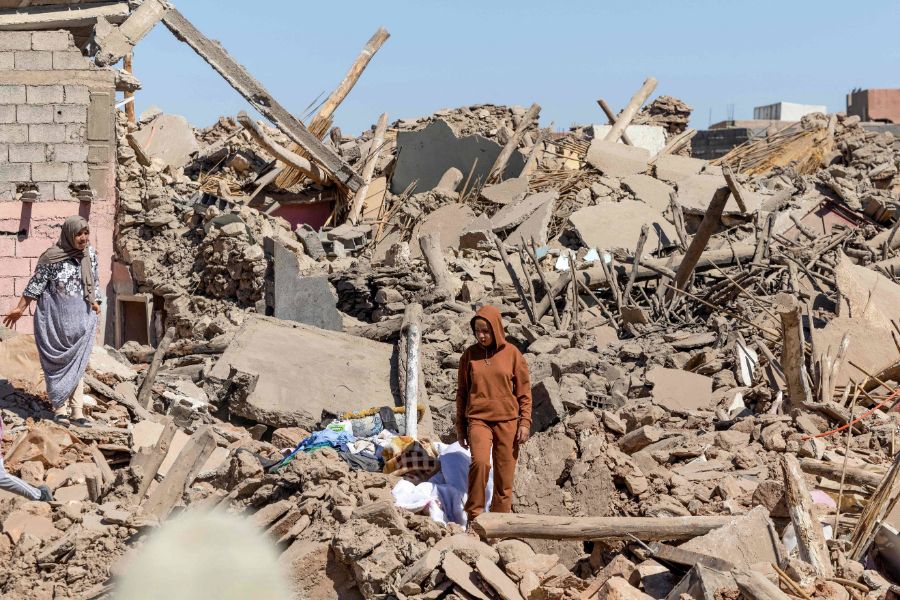
-
Published: 10 September 2023

The earthquake that hit the kingdom of Morocco on Sunday morning recorded the second strongest aftershock since Friday night, its intensity reached 4.5 degrees, according to the director of the National Institute of Geophysics Nasser Jabbour told the local hasbris website, explaining that "seismic activity began to gradually decrease".
Edited by| Hugh Gey
Nature section - CJ journalist
Hauz - September,10,2023
Morocco is mourning its victims after the violent earthquake that destroyed a large part of the country and claimed the lives of more than two thousand people, according to an official toll that is expected to rise as search operations continue.
The earthquake that occurred on Friday night, Saturday, with a magnitude of 7, according to the Moroccan Center for scientific and Technical Research (6.8 according to the US Geological Survey), is the strongest earthquake ever measured in Morocco. The interior ministry announced in a new statistic that the number of victims has risen to 2,122 dead and 2,421 injured.
The state of Hauz is the epicenter of the earthquake and the most affected, with 1,351 people killed, followed by Taroudant state, where 452 people were killed. In these two areas, located southwest of the tourist city of Marrakech, the earthquake destroyed entire villages.
Rescue teams on Sunday accelerated their operations in search of possible survivors amid the rubble left by an earthquake that destroyed many villages south of Moroccan Marrakech on Friday night, leaving more than two thousand dead, according to the latest official tally on Saturday night.
The kingdom is still under the shock of the most violent earthquake of its kind, whose intensity reached 7 degrees on the Richter scale, according to the National Center for scientific and Technical Research (6.8 according to the US Earthquake Authority).
French President Emmanuel Macron confirmed his country's readiness to help Morocco, in remarks at the end of the summit of the group of twenty countries in New Delhi.
"We have mobilized all the technical and security teams to be able to intervene when the Moroccan authorities deem it useful,"he said.
A team of French volunteer rescuers arrived in Morocco at dawn on Sunday to take part in rescue operations near Marrakech, according to local French authorities.
The team consists of four rescue, support and search specialists, a nurse and a specialist trainer accompanied by a search dog. The mission, coming from Lyon (centre), carried with IT equipment weighing about 300 kg.
Spain announced on Sunday that it will send search and rescue teams to Morocco to support local authorities in relief operations after the earthquake that killed more than two thousand people, while France confirmed its readiness to help whenever Rabat deems it necessary.
Spanish Foreign Minister Jose Manuel albares told Radio Catalunya that the aid was "a sign of Spanish solidarity and the feeling of friendship that unites the Spanish people with the Moroccan people," noting that he had received a call from Moroccan prime minister Aziz akhnoush early on Sunday to ask for help.
The Spanish minister stressed that Madrid will provide " as much assistance as Morocco needs, first of all we are preparing search and rescue teams because trying to find and rescue as many people alive as possible is an emergency. When the time comes for reconstruction, Spanish assistance will also be ready,"he said.
{source}<script async src="https://pagead2.googlesyndication.com/pagead/js/adsbygoogle.js?client=ca-pub-4474625449481215"
crossorigin="anonymous"></script>
<!-- moss test ad -->
<ins class="adsbygoogle"
style="display:block"
data-ad-client="ca-pub-4474625449481215"
data-ad-slot="6499882985"
data-ad-format="auto"
data-full-width-responsive="true"></ins>
<script>
(adsbygoogle = window.adsbygoogle || []).push({});
</script>{/source}
